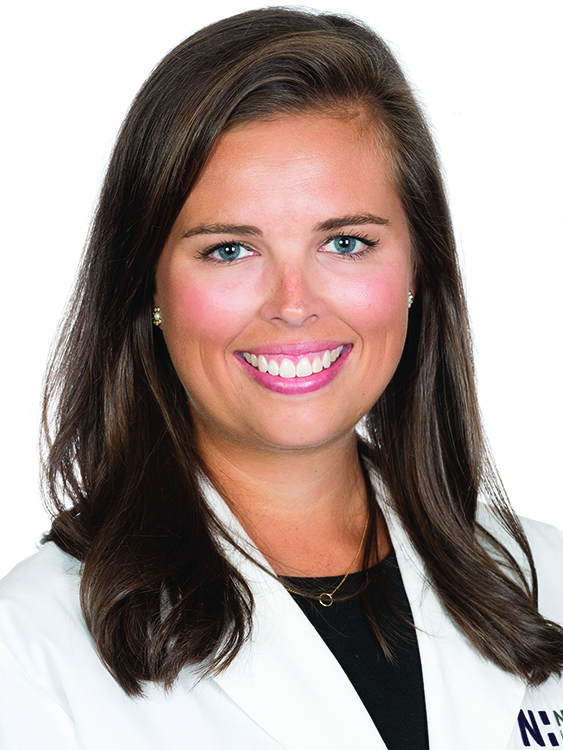As a student at West Virginia University in the late '70s, John Vance picked up a night shift working security at a private dorm. The extra income was nice, but there wasn’t much to do.
Most nights, he "stared at the door.” Until he finally walked over to the vending machine and bought a pack of cigarettes. And “that was it,” Vance said of the habit he’d carry with him (literally) for 45 years.
In 2022, Vance went in for his routine physical at Novant Health Mountainview Medical in King, North Carolina. Physician assistant Sean Reynolds reminded Vance that he was eligible for a low-dose CT (LDCT) scan, an annual screening test for some adults at high risk of developing lung cancer.
Despite a decade of eligibility, Vance usually skipped it. “Give me your honest opinion,” he said to Reynolds. “Do I really need to have this done?” And it was in that discussion that Vance decided to make the appointment.
His LDCT scan July 21, 2022, would lead to an important discovery: Vance has stage 2b non-small-cell lung cancer.
In laymen’s terms that means, “We caught it early enough to offer curative treatment with the hope of getting Mr. Vance into a remission this time next year,” said Dr. Andrew Dothard, an oncologist at Novant Health Cancer Institute in Winston-Salem.
'I wouldn't have known about it.'

Vance looked and felt completely healthy. At 66, he works full-time as a retail sales associate at the Auto Zone in King. He’s been with the company for decades, swapping his managerial hat about five years ago to get back to what he loves most – talking shop, working with car parts and helping customers.
“Someone said they always look for John’s car in the parking lot because if he’s there, they’ll walk out with the part they need,” his wife, Brenda, said.

Together, they’ve built a blended family – both had children from previous marriages and they now have 14 grandkids. They enjoy grilling out, riding bicycles and going to church at Trinity United Methodist in King.
The cancer diagnosis was scary. But catching it early, thanks to the scan, was a relief. “I wouldn’t have known about it. I didn’t have any symptoms, so I’m glad we found it when we did," Vance said.
Most early-stage lung cancers are asymptomatic.
Lung cancer is the leading cause of cancer death in the United States. It will kill an estimated 127,070 individuals in 2023.
“Not only do lung cancers tend to spread fairly quickly, a lot of times they don’t cause any symptoms until it’s too late,” Dothard said. “Once lung cancer has spread outside of the lungs or chest, we’re dealing with stage 4 disease, which is terminal for the large majority of patients."
Low screening rates are another contributing factor. Less than 25% of eligible people get a LDCT scan each year. If you qualify, ask your doctor about getting screened. He or she will help you find a location near you.
"I'd do anything to convince a smoker or someone who qualifies for a lung cancer screening test to go ahead and do it."
Your doctor can help you get a low-dose CT scan.
The U.S. Preventive Services Task Force recommends a yearly low-dose CT scan for people who meet the following criteria:
- Adults between ages 50 to 80:
- Who have a 20 pack-year smoking history (or more).
- Who currently smoke or have quit within the past 15 years.
To get your “pack-year smoking history,” take the number of packs of cigarettes smoked per day and multiply that by the number of years smoked.
- Someone who smoked one pack a day for 10 years, for example, has 10-pack years of smoking.
- Someone who smoked two packs a day for 10 years, for example, has 20-pack years of smoking.
- And finally, someone who smoked one pack a day for 20 years would also have 20-pack years of smoking.
Most lung nodules are benign.
If you qualify, your doctor can help you get a low-dose CT scan.
During the scan, a computer linked to an X-ray machine gives off a very low dose of radiation (since most eligible patients will be getting them for many years), providing detailed images that help radiologists determine if there are any nodules in the lungs.
A lung nodule (or mass) is a small abnormal area that is sometimes found during a CT scan of the test, like a lung cancer screening test, for example.
Most nodules seen on scans are the result of old infections or scar tissue, meaning they are benign (not cancerous). But tests are often needed to make sure a nodule is not cancer.
Lung Nodule Clinics help diagnose – or rule out – lung cancers.
To help detect lung cancer – or rule it out, in some cases – Novant Health opened two Lung Nodule Clinics in 2022, one in Charlotte and another in Winston-Salem.
“We understand the stress that can come with additional testing. And we don’t want patients to wait longer than they need to,” said Hannah Palmer, a nurse practitioner who helped open the Winston-Salem clinic.
Evaluating a lung nodule can take weeks to months, but their team helps order the appropriate testing, guiding patients through the process.
If a nodule is concerning for cancer, the patient’s case is reviewed by a multidisciplinary team of pulmonologists, radiologists, oncologists, thoracic surgeons and more. The experts consult on cases and recommend the best plan of action for each patient.
Here's what the process looked like for Vance:
- July 21, 2022, he got a LDCT scan.
- A radiologist noted a "suspicious nodule" while reviewing the scan, so Vance was referred to the Lung Nodule Clinic.
- They scheduled a PET scan, used to help determine if a nodule is cancerous (or benign).
- On Aug. 1, the multidisciplinary team reviewed his case and recommended surgical removal.
- Vance got a Pulmonary Function Test (or PFT), used to check lung function before surgery.
- On Sept. 6, Dr. Hadley Wilson, a thoracic surgeon at Novant Health Cardiothoracic Surgeons in Winston-Salem, surgically removed the nodule and accompanying lymph nodes.
- It was examined by a pathologist to accurately diagnose Vance with 2b non-small-cell lung cancer.
Quitting smoking is 'a mental game.'
Vance hasn’t smoked a cigarette since surgery on Sept. 6, 2022. It’s the same day he turned 66.
“I was in the hospital for three and a half days, so I figured the nicotine was mostly out of my body by the time I left,” Vance said. “Now, it’s just a mental game.”
He recovered from surgery in just weeks and went back to work full time at Auto Zone. “I have to do something,” he said, smiling.
On Oct. 10, Dothard prescribed a yearlong treatment plan, “a mix of chemotherapy and immunotherapy that will give us a shot at curing Mr. Vance."
"Of course, there are no guarantees. Nothing in medicine is. But his prognosis is good. And that’s what we focus on," Dothard said.















